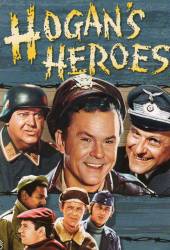The Great Impersonation - S1-E21
Factual error: When the three captured heroes stand before the Gestapo officer, he sweeps three sets of US identification tags into his hand. The names and uniforms suggest that the three captured personnel are from three different armies. Identification tags differ greatly between armies, all wearing US-style with their usual uniforms they would be worse off than wearing none at all. The Geneva convention would allow for them to be shot on the spot as spies under these circumstances since they initiated combat (blew something up) wearing false uniforms. (00:03:20)
The Great Impersonation - S1-E21
Plot hole: This episode revolves around training the reluctant, untalented Schultz to impersonate Klink to get the captured heroes back from the Gestapo. This is actually a pretty common theme, somebody, usually one of the heroes, impersonating an officer to free a prisoner. The plot gives no reason why this time, they would have to use the cowardly, untalented Schultz instead of doing it themselves.






Answer: It's a comedy, not a documentary.
stiiggy
Perhaps it was counterfeit. There are numerous episodes where they deal in counterfeit monies.